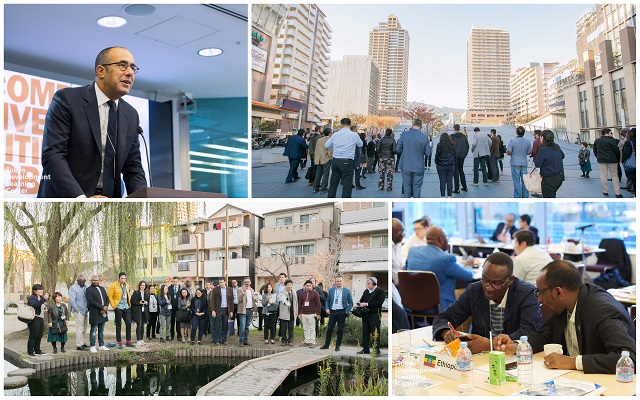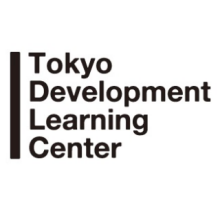Technical Deep Dive on Competitive Cities
World Bank Tokyo Development Learning Center (TDLC)
In collaboration with Competitive Cities Community of Practice (CoP)
Tokyo, Yokohama and Kobe, Japan | Oct 30 - Nov 3, 2017

Photo: WB TDLC
October 30 – November 3, 2017, Tokyo, Yokohama and Kobe - TDLC organized the Competitive Cities TDD jointly with World Bank’s Social, Urban, Rural and Resilient Global Practice (GSURR), the Trade and Competitiveness Global Practice, Competitive Cities Community of Practice (CoP), City of Kobe, City of Yokohama, and the Government of Japan. Total number of 67 participants including city officials and experts from 14 cities of 12 countries participated and learned Japanese experience and know-how on Competitive cities development.
Today more than a half of global population lives in cities, and 80% of GDP is produced in cities. Sameh Wahba, Director, GSURR of the World Bank, stressed in his opening remarks, “Urbanization often entails economic prosperity, but these two do not necessarily come hand-in-hand,” urging city officials to commit and speed up the urban development of their cities.
This TDD highlighted the importance of city decision makers’ leadership in creating competitive cities, focusing on firm-level performance for improved job creation and growth, and utilizing coalition of public and private sector to transform their cities into competitiveness champions. The World Bank announced that Kobe was selected for a new series of Case Studies extending the World Bank’s flagship report called “Competitive Cities for Jobs and Growth.” This flagship report provides a framework for helping city leaders think through the what, who and how of local economic growth and development. Kobe’s “Creative Reconstruction” is expected to be of great interest to many of World Bank’s clients.
Participants including policy makers and city officials shared their challenges and lessons learned through their own experiences of building competitive cities. Although the progress of competitive cities varies from country to country, there are some common challenges including unemployment, lack of infrastructure and connectivity, and lack of public-private coordination. World Bank experts led the discussion on analyzing the city economy, creating vision, and designing policy, and moreover how to choose policy tools to change the vision into reality. Japanese experts from Tokyo and Yokohama presented their experiences and lessons learned from urban redevelopment and creation of competitiveness of the city. Consistency and tenacity of city redevelopment over a long period were pointed out during the discussion.
Participants also visited Kobe City to learn its success in recovering from Great Hanshin-Awaji Earthquake and turning into competitive city by developing a biomedical cluster. Site visit to Southern Area of Rokkomichi Station provided participants the idea of how Kobe has successfully recovered from the earthquake and became a livable city for residents.
Participants went through business simulations and exercises on talent attraction and tried to find solutions for the problem they face, followed by implementing what they learned.
TDD delegations developed practical action plans on the last day of this intense 5-day course containing key takeaways, approaches, and next steps to plan and implement the competitive cities planning into action in their countries. The major takeaways and next steps raised during the presentation include private sector involvement for job creation, citizen participation, attracting investments to the city and having the political will. Further support by the World Bank on providing capacity building, and sharing the experience in achieving consensus and common vision among stakeholders were also raised.
Presentations, Materials, and City Action Plan Presentations attached below:
- Day 1-1 Competitive Cities Overview
- Day 1-2 Competitive Cities for Jobs and Growth
- Day 1-3 Mayors Toolkit Part 1: Analytical tools
- Day 1-4 Mori Memorial Foundation
- Day 1-5 Mori Bldg
- Day 1-6 Public Private Dialog
- Day 2-1 Yokohama City's 6 major projects
- Day 2-2 Building institutional capabilities
- Day 2-3 Mayors Toolkit Part 2: Policy tools
- Day 3-1 KOBE Biomedical Innovation Cluster
- Day 3-2 Redevelopment Project of Southern Area of Rokkomichi Station
- Day 5 Action Planning Presentations
- Agenda


Blog » News, Materials and Presentations: TDD on Competitive Cities, 30 Oct - 3 Nov 2017
News, Materials and Presentations: TDD on Competitive Cities, 30 Oct - 3 Nov 2017
Technical Deep Dive on Competitive Cities
World Bank Tokyo Development Learning Center (TDLC)
In collaboration with Competitive Cities Community of Practice (CoP)
Tokyo, Yokohama and Kobe, Japan | Oct 30 - Nov 3, 2017
Photo: WB TDLC
October 30 – November 3, 2017, Tokyo, Yokohama and Kobe - TDLC organized the Competitive Cities TDD jointly with World Bank’s Social, Urban, Rural and Resilient Global Practice (GSURR), the Trade and Competitiveness Global Practice, Competitive Cities Community of Practice (CoP), City of Kobe, City of Yokohama, and the Government of Japan. Total number of 67 participants including city officials and experts from 14 cities of 12 countries participated and learned Japanese experience and know-how on Competitive cities development.
Today more than a half of global population lives in cities, and 80% of GDP is produced in cities. Sameh Wahba, Director, GSURR of the World Bank, stressed in his opening remarks, “Urbanization often entails economic prosperity, but these two do not necessarily come hand-in-hand,” urging city officials to commit and speed up the urban development of their cities.
This TDD highlighted the importance of city decision makers’ leadership in creating competitive cities, focusing on firm-level performance for improved job creation and growth, and utilizing coalition of public and private sector to transform their cities into competitiveness champions. The World Bank announced that Kobe was selected for a new series of Case Studies extending the World Bank’s flagship report called “Competitive Cities for Jobs and Growth.” This flagship report provides a framework for helping city leaders think through the what, who and how of local economic growth and development. Kobe’s “Creative Reconstruction” is expected to be of great interest to many of World Bank’s clients.
Participants including policy makers and city officials shared their challenges and lessons learned through their own experiences of building competitive cities. Although the progress of competitive cities varies from country to country, there are some common challenges including unemployment, lack of infrastructure and connectivity, and lack of public-private coordination. World Bank experts led the discussion on analyzing the city economy, creating vision, and designing policy, and moreover how to choose policy tools to change the vision into reality. Japanese experts from Tokyo and Yokohama presented their experiences and lessons learned from urban redevelopment and creation of competitiveness of the city. Consistency and tenacity of city redevelopment over a long period were pointed out during the discussion.
Participants also visited Kobe City to learn its success in recovering from Great Hanshin-Awaji Earthquake and turning into competitive city by developing a biomedical cluster. Site visit to Southern Area of Rokkomichi Station provided participants the idea of how Kobe has successfully recovered from the earthquake and became a livable city for residents.
Participants went through business simulations and exercises on talent attraction and tried to find solutions for the problem they face, followed by implementing what they learned.
TDD delegations developed practical action plans on the last day of this intense 5-day course containing key takeaways, approaches, and next steps to plan and implement the competitive cities planning into action in their countries. The major takeaways and next steps raised during the presentation include private sector involvement for job creation, citizen participation, attracting investments to the city and having the political will. Further support by the World Bank on providing capacity building, and sharing the experience in achieving consensus and common vision among stakeholders were also raised.
Presentations, Materials, and City Action Plan Presentations attached below: